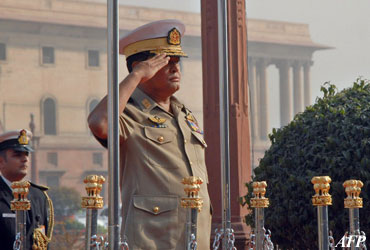The Burmese Parliament on Wednesday appointed Vice Admiral Nyan Tun, the Navy commander-in-chief, as one of the country’s two vice presidents. Observers said he is a political moderate.
 The military representatives in Parliament, who make up 25 per cent of the seats, nominated Admiral Nyan Tun for the vacant vice-president position at a joint session of Parliament, and he was quickly confirmed as vice-president.
The military representatives in Parliament, who make up 25 per cent of the seats, nominated Admiral Nyan Tun for the vacant vice-president position at a joint session of Parliament, and he was quickly confirmed as vice-president.
Under the Constitution, he must resign his military position.
Former Vice President Tin Aung Myint Oo, who was considered a tough hardliner, submitted his resignation letter to the president on July 2, citing ill health.
There was speculation that Tin Aung Myint Oo resigned because of disagreements with reformist President Thein Sein, who had announced a second wave of economic and social reforms to be undertaken in the country.
The replacement of Tin Aung Myint Oo, a former four-star general who worked closely with former dictator Than Shwe, is seen by observers as part of a possible cabinet reshuffle involving various hardline ministers from the former military government.
"He needs to make the cabinet more vibrant and effective and he has to remove some conservatives who are reluctant to accept his reforms," said one lawmaker, who declined to be identified, when Tin Aung Myint Oo announced his resignation.
National Assembly speaker Khin Aung Myint announced the appointment of Nyan Tun during a legislative session in Naypyitaw, and Nyan Tun was sworn in shortly afterward.
Naval commander since 2008, Nyan Tun served briefly with military intelligence in the 1980s, and he has since held various positions within the navy.
Burma’s Constitution provides for two vice presidents who have equal power. Sai Mauk Hkam, who comes from the Shan ethnic minority, is the other vice president.
The Burmese navy has 19,000 men and women members, and it operates more than 122 vessels. Before 1988, the navy was small and its role in the many counterinsurgency operations was much less conspicuous than those of the army and air force. Yet the navy has always been an important factor in Burmese security, and it was dramatically expanded in recent years to a provide a blue water capability and an external threat defence role in Burmese territorial waters.


